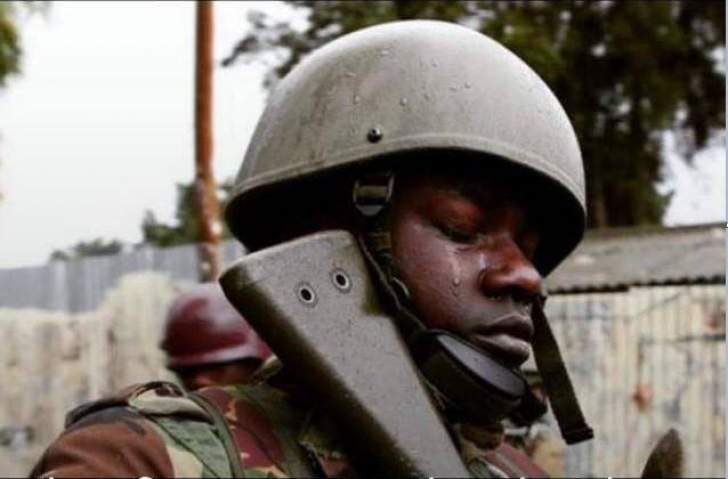By Veritas
Introduction
A document purporting to emanate from the Public Relations Directorate at Army Headquarters has been circulating on social media, warning the public that the ZNA (the Zimbabwe National Army) will be conducting “snap searches” in residential areas in order to find stolen army uniforms and similar clothing. The document states that the searches are necessary because of a sharp rise in thefts and robberies carried out by criminals using “military regalia”. In polite but firm tones the document urges members of the public to hand over any such regalia to the search teams or surrender them to their nearest police station.
Veritas cannot vouch for the authenticity of the document, but military personnel searched houses in the aftermath of last month’s disturbances so it is an opportune moment to examine what powers, if any, soldiers have to search civilian premises.
Powers of Search Generally
A search of a person’s home or property is an infringement of their right to privacy, guaranteed by section 57 of the Constitution in the following terms:
“Every person has the right to privacy, which includes the right not to have—
(a) their home, premises or property entered without their permission;
(b) their person, home, premises or property searched;”
The right is not absolute because there must be circumstances when law enforcement authorities can search premises in order to arrest suspected criminals, seize evidence needed for detecting or prosecuting crime and so on. The law however is careful to protect privacy so far as possible, and the courts in this country and elsewhere have laid down criteria that must be met for a search to be legal:
· The search must be conducted in terms of legislation – there is no general common-law power of search.
· The legislation must clearly define the power of search.
· The search must have a compelling public objective (for example crime control).
· The search should generally be authorised by an independent authority (for example, by a magistrate issuing a search warrant).
The first question to ask, therefore, is: Is there any legislation which gives military personnel the power to search civilian premises?
Legislative Authority for Soldiers to Conduct Searches
Only two Acts empower soldiers to conduct searches:
The Defence Act
Section 41 of the Defence Act permits soldiers to search for stolen property, but the only persons who may be searched are members of the Defence Forces and the only premises that may be searched are premises belonging to the State and occupied or controlled by the Defence Forces. The Act does not allow the homes of civilians to be searched.
The Public Order and Security Act (POSA)
Section 37 of POSA states that if the Police require “assistance … for the purpose of suppressing any civil commotion or disturbance in any police district” the Defence Forces may be deployed “to assist the police in the exercise of their functions under this Act in the police district concerned.” The section goes on to say that when the Defence Forces are so deployed:
“a member of the Defence Forces who is assisting a police officer in the exercise of his functions under this Act shall have the same powers, functions and authority … as a member of the Police Force.”
Police officers have power to search premises including homes, as we shall see, so section 37 gives soldiers the same power. But the power is limited: it can be exercised only while the soldiers are assisting the police in suppressing a “civil commotion or disturbance”. Once the commotion or disturbance has been suppressed the soldiers’ power to search ceases.
Section 33 of POSA empowers peace officers – a term that includes police officers and soldiers assisting the police under section 37 – to search people and premises within an area that has been cordoned off by the police to contain “any public disorder or public violence within the area”. However, searches under the section are limited to finding people reasonably suspected of offences relating to the public disorder or violence, or evidence relating to such offences. And in the case of soldiers assisting the police, their powers cease as soon as they have suppressed the commotion or disturbance that caused the police to call for their assistance.
Neither the Defence Act nor POSA, therefore, gives soldiers power to search civilian homes for the purpose of general crime control – which is the purpose of the “snap searches” mentioned in the document purportedly emanating from the Army’s Public Relations Directorate. The “snap searches” are to recover stolen army uniforms, not to suppress civil commotions or disturbances. In any event the commotions and disturbances which gave rise to the Army being deployed to assist the police have been suppressed, so soldiers have no legal power at all to search civilian premises.
Illegality of “Snap Searches”
There is a further point to be made: whatever the legal powers of soldiers may be, “snap searches” of people’s homes are illegal no matter who carries them out.
The Criminal Procedure and Evidence Act [CP&E Act] gives law enforcement agents – primarily police officers – power to search premises to seize articles concerned in or reasonably believed to be concerned in a crime, or reasonably believed to be evidence of a crime. The power is strictly limited, however:
· Normally searches must be authorised by a search warrant issued by a magistrate or justice of the peace (other than a police officer) who has reasonable grounds for believing that an article liable to be seized is in any particular premises or area.
· A search warrant must specify clearly and precisely the articles to be searched for and the premises or area to be searched. The courts insist that search warrants are worded very precisely.
· In certain circumstances police officers can search premises without a search warrant, but only if:
· the owner or occupier of the premises consents to the search, or
· the officers believe they would get a warrant if they applied for one but delay in applying for it would defeat the object of the search.
The CP&E Act certainly does not envisage “snap searches”, i.e. random searches conducted within a particular area. Randomness is a concept wholly inconsistent with the strict limits the Act places on powers of search, particularly the requirement that searches must generally be authorised by search warrants. Even though the Act allows a warrant to authorise a search within an “area”, the area must be small enough to reduce the element of randomness. A warrant could not specify such a wide area as “the residential suburbs of Harare” or even the area of a named high-density suburb, because that would allow random or indiscriminate searches of houses to be conducted within the wide area.
Effect of Illegal Search
One final point. What if an illegal search turns up evidence of a crime – or, more specifically, what if soldiers searching a house illegally discover army uniforms stolen from Army stores?
The answer is that almost certainly a court would refuse to allow the prosecution to lead evidence that the soldiers found the uniforms. Section 70(3) of the Constitution is to the effect that illegally obtained evidence cannot be produced in a criminal trial if it “would render the trial unfair or would otherwise be detrimental to the administration of justice or the public interest.” Section 258A of the CP&E Act indicates how a court should decide whether to allow illegally-obtained evidence to be produced. The section is not easy to understand but broadly it means that a court must strike a balance between the rights of the accused person and the integrity of the justice system on the one hand, and on the other the need to ensure that criminals do not escape justice through minor technicalities.
Conclusion
If a court were told that soldiers, whether knowingly or unknowingly, conducted random searches of peoples’ homes in complete violation of the law, it would be compelled to refuse to allow evidence to be led of what the soldiers discovered as a result of their searches. If a court were to allow such evidence to be heard the criminal justice system would be fatally compromised.






